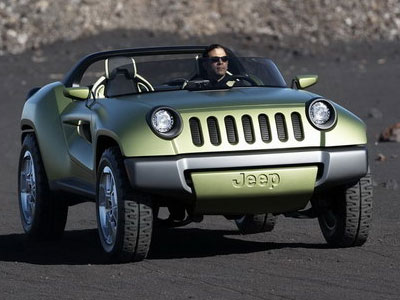 Materials used in constructing the Jeep Renegade concept were deliberately selected to be environmentally responsible, both in manufacture and end-of-vehicle-life recyclability.
Materials used in constructing the Jeep Renegade concept were deliberately selected to be environmentally responsible, both in manufacture and end-of-vehicle-life recyclability.Innovative construction includes one-piece molded soy-based foam seats and doors, a one-piece co-molded instrument panel with a urethane skin, a co-molded aluminum/silicone steering wheel, a one-piece molded chassis created without using environmentally-harmful resins, and a one-piece molded interior compartment "tub." This environmental care in designing the Renegade’s interior is aligned with Jeep’s "harmony with nature" philosophy.
"The Jeep Renegade concept’s interior — actually the entire vehicle — is designed to minimize the number of parts necessary for assembly and function," said Scott Anderson, principal interior designer of the Renegade concept. "We designed the Renegade with an eye toward simplification of systems, both in parts and processes."
The dual-cockpit instrument panel is symmetrically balanced for easy "plug and play" left-hand drive and right-hand drive applications. There is no conventional wiring. Instead, the instrument panel features wireless electronics in sealed, self-contained units, removable by the customer. The panel is built about an exposed cross-car beam containing an integrated power strip, and on the passenger side, yaw, pitch and roll indicators (also built into the fluid-fill gauges). The instrument panel itself is hollow, allowing ample open storage below the beam. Separately-configured impact-absorbing vinyl-wrapped knee-blockers "float" beneath the cross-car beam.
Located at the intersection of the steering wheel’s T-shaped spokes, the circular LED screen rotates, allowing the driver to select the drive mode, while a flattened rim provides roomier thigh clearance. A driver air bag is concealed beneath the screen. Red or green translucent shift buttons allow Park, Reverse or Drive selections.
The Jeep Renegade concept’s sporty doors incorporate unique canvas-pull remote "handles," while the rush of the moving landscape visible through the door’s elongated openings enhance the feeling of carefree, open-air mobility.









No comments:
Post a Comment